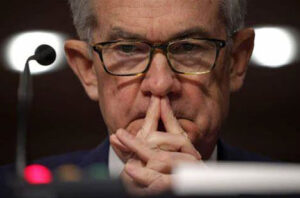Markets whipsawed as investors tried to interpret Fed Chair Powell’s comments. Although the indexes enjoyed a late day relief rally from the short-term oversold conditions bond yields on the short end of the curve continued to rise. This week’s plan for the price action instability continue with a slew of jobs data, GDP, PMI and manufacturing data for the bulls and bears to find inspiration.
Asian markets followed the U.S. markets overnight reliving recent selling pressure even as real estate issues in China expanded with Evergrande shares plunging. European markets are also trading higher this morning in a modest relief rally as China uncertainty expands. Ahead of a light day of earnings and economic data U.S. futures point to bullish open hoping to continue the relief rally started Friday afternoon to test overhead resistance levels.
Economic Calendar


Earnings Calendar

Notable reports for Monday include HEI.
News & Technicals’
China Evergrande Group, one of the largest real estate developers in China, has been facing a severe liquidity crisis that has shaken the confidence of its investors and creditors. The company’s shares have been suspended from trading on the Hong Kong exchange since March 21, 2023, after closing at a record low of 1.65 Hong Kong dollars ($0.13) per share on March 18. The suspension came as the company reported a massive loss of 39.25 billion yuan ($5.38 billion) for the first half of 2023, with total liabilities reaching a staggering 2.39 trillion yuan. The company has been struggling to repay its debts and avoid default, as it faces regulatory pressure, legal challenges, and public protests from its customers and suppliers.
The labor market in the United States has witnessed a surge of strikes and protests by workers who demand better pay and working conditions from their employers. According to data from the Cornell University School of Industrial and Labor Relations, more than 320,000 workers have participated in at least 230 strikes so far this year, affecting various industries such as health care, education, hospitality, and manufacturing. Some of the workers have successfully negotiated favorable labor deals, such as UPS workers and airline pilots, while others are still in the process of bargaining or threatening to walk out, such as Hollywood writers and actors and auto workers. The wave of labor unrest reflects the growing dissatisfaction and frustration of workers who feel underpaid, overworked, and unsafe amid the pandemic and the economic recovery.
Microsoft, the tech giant and the owner of Xbox, has made a renewed bid to acquire Activision Blizzard, the American game publisher behind popular titles such as Call of Duty, World of Warcraft, and Candy Crush. The company has submitted a fresh takeover proposal of $69 billion to the U.K. regulators, who rejected its initial offer on the grounds of anti-competitive concerns in the nascent cloud gaming market. Brad Smith, Microsoft’s vice-chairman and president, told CNBC that the company “really tried to take concerns to heart” and addressed the issues raised by the regulators in its new proposal. He also said that the deal would benefit both gamers and developers by creating more diverse and innovative games. However, he acknowledged that the final decision rests with the regulators and that “it will be up to them to decide whether that path is clear”.
On Friday, stock markets rose as they tried to interpret Fed Chair Powell’s speech at the Jackson Hole symposium for any hints about future interest-rate moves. Chair Powell struck a balanced tone, saying that the Fed would base its decisions on the data but said rate increases may not be over. Global markets had mixed results, and Treasury yields as shorter-term rates went up. Today we have a light day on both economic and earnings calendar, however, later this week will be filled with jobs data and a key GDP report. Plan for price volatility to remain high with investors hoping for a relief rally with the uncertainty of the weaking China economy as there real estate crisis expands and the consumer in the U.S. consumer shows signs of inflation impacts with record credit card and household debt burdens.
Trade Wisely,
Doug








Comments are closed.